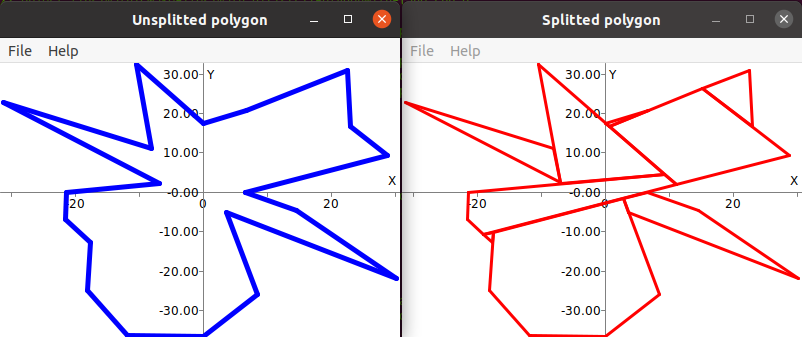Example: math_polygon_split




C++ example source code:
/* +------------------------------------------------------------------------+ | Mobile Robot Programming Toolkit (MRPT) | | https://www.mrpt.org/ | | | | Copyright (c) 2005-2024, Individual contributors, see AUTHORS file | | See: https://www.mrpt.org/Authors - All rights reserved. | | Released under BSD License. See: https://www.mrpt.org/License | +------------------------------------------------------------------------+ */ #include <mrpt/gui/CDisplayWindowPlots.h> #include <mrpt/math/geometry.h> #include <mrpt/system/datetime.h> #include <mrpt/system/os.h> #include <iostream> using namespace std; using namespace mrpt; using namespace mrpt::gui; using namespace mrpt::math; const unsigned int NUMBER_OF_EDGES = 20; const double MIN_RADIUS = 5; const double MAX_RADIUS = 40; const double DIFF_RADIUS = MAX_RADIUS - MIN_RADIUS; inline double randomDouble(size_t precision = 1000) { return MIN_RADIUS + DIFF_RADIUS * (static_cast<double>(rand() % precision) / static_cast<double>(precision - 1)); } void display() { CDisplayWindowPlots win1("Unsplitted polygon", 400, 300); win1.enableMousePanZoom(true); TPolygon2D randomPoly(NUMBER_OF_EDGES); for (size_t i = 0; i < NUMBER_OF_EDGES; i++) { double ang = 2 * M_PI * i / NUMBER_OF_EDGES; double radius = randomDouble(); randomPoly[i].x = radius * cos(ang); randomPoly[i].y = radius * sin(ang); } randomPoly.removeRedundantVertices(); std::vector<double> x, y; randomPoly.getPlotData(x, y); win1.plot(x, y, "b-5", "Polygon"); win1.axis_fit(); std::vector<TPolygon2D> convexPolys; if (!splitInConvexComponents(randomPoly, convexPolys)) convexPolys.push_back(randomPoly); CDisplayWindowPlots win2("Splitted polygon", 400, 300); win2.enableMousePanZoom(true); std::string plotName = "Polygon0"; for (std::vector<TPolygon2D>::const_iterator it = convexPolys.begin(); it != convexPolys.end(); ++it) { plotName[7]++; it->getPlotData(x, y); win2.plot(x, y, "r-3", plotName); if (!it->isConvex()) cout << "FAIL.\n"; } win2.axis_fit(); while (!mrpt::system::os::kbhit() && win1.isOpen() && win2.isOpen()) ; } int main(int argc, char** argv) { srand((unsigned int)mrpt::system::extractDayTimeFromTimestamp( mrpt::Clock::now())); display(); return 0; }